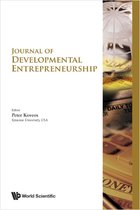| dc.contributor.author | Omer, Nasraldin | |
| dc.contributor.author | Van Burg, Elco | |
| dc.contributor.author | Peters, Ricardo M. | |
| dc.date.accessioned | 2021-09-14T10:26:29Z | |
| dc.date.available | 2021-09-14T10:26:29Z | |
| dc.date.issued | 2015 | |
| dc.identifier.citation | Omer, N. et al. (2015). Internationalization as a "work-around" strategy: How going abroad can help smes overcome local constraints. Journal of Developmental Entrepreneurship, 20(02), 1550011 .https://doi.org/10.1142/S1084946715500119 | en_US |
| dc.identifier.issn | 1793-706X | |
| dc.identifier.uri | https://doi.org/10.1142/S1084946715500120 | |
| dc.identifier.uri | http://hdl.handle.net/10566/6673 | |
| dc.description.abstract | Although risk has always been at the center of entrepreneurship, research on risk recognition in new ventures is limited. Applying cognitive information-processing theory, we develop a theoretical framework that explores the interactive influences of entrepreneurs' social networks and their cognitive characteristics on the outcomes of risk recognition. We test the framework on a sample of 226 Chinese entrepreneurs. The results show that network size, tie strength and structural holes enhance risk recognition outcomes and that cognition (i.e. risk propensity and illusion of control) generally reduces such effects, except in the case of illusion of control, which has no effect on structural holes. | en_US |
| dc.language.iso | en | en_US |
| dc.publisher | World Scientific Publishing | en_US |
| dc.subject | Risk recognition | en_US |
| dc.subject | Social network | en_US |
| dc.subject | Cognition | en_US |
| dc.subject | China | en_US |
| dc.title | Internationalization as a "work-around" strategy: How going abroad can help smes overcome local constraints | en_US |
| dc.type | Article | en_US |

